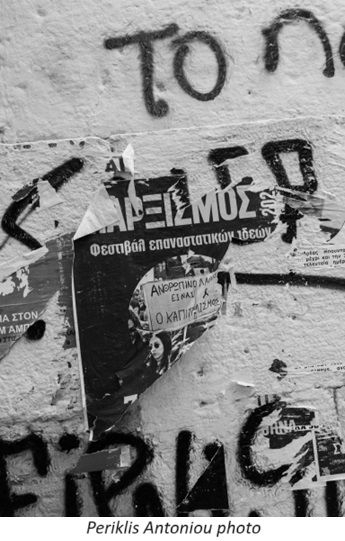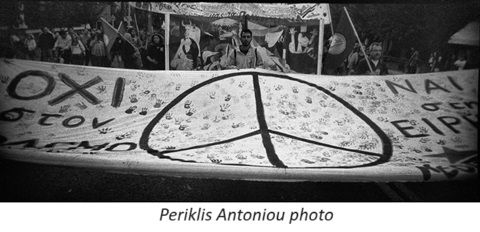The director that was filming a documentary on the Polytechnic uprising and requested my testimony was quite young himself, but not too far removed from the events, especially the flair up after the restoration of democracy. He told me he wanted me to talk about my personal experiences, about the things that I did, in the first person, as he had observed that everybody that had spoken before me began with “we”, under which they described their own adventure. I tried to comply. But as the discussion progressed, no matter how careful I was, the more I slipped into the same “we”.
After the fact, I thought to myself that there was no other way. You can only describe what happened back then, and what you experienced in the plural, using “we”, unless you are a pathological egomaniac. Inside this “we” you have included your personal presence. It is a characteristic emotion, not only regarding what happened then but also in the many things that followed. We had to pass through the decades, as time sinks exhaustingly, in order to speak and think in terms of “I”: Of how you conceptualised, how you lived, how you carried yourself through the events and through your life that was determined by the events. When you broke away from the collective – albeit never so definitively so that the “we” would cease to dominate.
But since this is not the space to evaluate history, let us return to the image of the twenty two -year- old lad that is required to cope with something that resembles a historical event. Something he does not know exactly what it is. An incident? A confrontation? A massacre?
In an uprising, everything happens as if in a dream. Many things in a short time, unbound from the laws of normality, or even of gravity.
However, I spent the three days under an almost unbearable load, and with a constant knot in the stomach. What must we do? As if the entire responsibility of organising and guiding the uprising was only weighing on my shoulders. That was my feeling, but it was also a common feeling! I was transcending, we were transcending into adulthood.
After 1973, we – and this time “we” refers to the Communist Party Youth, of which I was a member for many years – considered the Polytechnic uprising as a simple incident in a course that would come to completion with a large revolution that would change the world. Thus, the Polytechnic uprising could not be anything more than a simple episode in this revolutionary process, where the stakes were much higher and definitive than delivering a blow to the military dictatorship, or even overthrowing it altogether. This fantasy conception was guiding us in downgrading the historical meaning of the uprising and the incision in slogans beginning with “The Polytechnic was just the beginning…” (I am describing how I, personally, was assimilating this political and emotional placement, and obviously, this narration cannot include all the members of the Youth Organisation of my generation).
And as for its “utilisation” in everyday life and as an anniversary, it served only as a big opportunity to unravel the anti-imperialistic and revolutionary dispositions of parts of the younger generation, and also as a large school of revolutionary experience. When people are awoken, overcome hesitations, fears, shortcomings, and preconceptions, they march out to the streets and demand everything – whether it be possible or impossible – that they have been suppressing inside themselves for years.
I fell in line with this view, but not without ruptures. I could not distance myself from the lively emotions of the days of worry.
And as the years passed, and the revolution that was expected and would change the world, was delaying – before being indefinitely postponed – the more the memory of, what had proven to be, the single great event of a lifetime that longed to be forged in the grandest confrontations, grew… And then, a comrade, a friend of the same generation told me sorrowfully just before he died: “We thought that we would die on some barricade, and here we are now…” The memory of the event was enlarging its emotional dimensions. After all, had something better ever happened to us? We should, in fact, be grateful for having experienced it, and for having it leave its mark on the way we lived our lives.
After all, it is not a given that one will have the chance to live the tension and the burning sensation of an uprising. The sense of community, solidarity, of the rising of a volcanic momentum that melts away the individual feelings, the petty pursuits and selfishness, before producing an incandescent precipitate that can still transmit the fertility of its materials, even when it has frozen over a few days later, to the participants, to the next generations, to life itself.
I did not have this feeling in the years that immediately followed 1973. I mostly received the acceptance of a status quo that aimed at incorporating radicalism, on the one hand, and of those who were at a disadvantage and were trying to be strong and fight back, on the other.
And in the midst of my repulsion towards the depraving behaviour of the former, and the exaltation of the latter, I performed my logical processing of the event.
And as time was moulding the precipitate inside of me, I would stand awkwardly as an apologist and a quipster. Being at both an emotional distance and closeness. Talking about the event at gatherings, praising it in order to simultaneously undermine it; not annul it, but rather to degrade its significance to what could be considered as a kind of preliminary event, in a life that had big things in store.
And while I was telling myself that I was keeping a distance, my children grew, my son and daughter, and imposed on me their own feelings that altered my calm, logical processing and arrangements. The world was becoming more alive, and the past was returning to claim its share from the present, through the eyes of the children. It was like an undermining corrosion of my decisions; like a revenge of the events; like a reminder that no matter how much you insist on departing, the events, all you did and all you neglected to do, will ultimately find you!
And as much as it had not been nostalgia, it was becoming a sense of serenity, that we had in abundance during our lifetime, despite the frustrations and its bitter versions.
So, when my son passed, at the age of twenty-two, as old as I was during the Polytechnic uprising, I would visit his grave with a red flower, every year on its anniversary (November 17).
A connection of the best, the most painful and the most beloved of things. Or a revenge of the event and the emotion.


